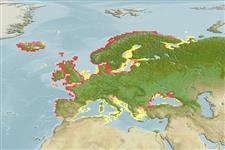>
Salmoniformes (Salmons) >
Salmonidae (Salmonids) > Salmoninae
Etymology: Salmo: Latin, salmo, Plinius = salmon (Ref. 45335); trutta: trutta is a Latin name for trout (Ref. 10294).
More on author: Linnaeus.
Environment: milieu / climate zone / depth range / distribution range
البيئة
بحري; المياه العذبة; مياه مخلوطة; أسماك صاعدة (Ref. 51243); نطاق العمق 0 - 28 m (Ref. 101587), usually 1 - 2 m (Ref. 101587). Temperate; 18°C - 24°C (Ref. 12741); 71°N - 34°N, 25°W - 57°E
Europe and Asia: Atlantic, North, White and Baltic Sea basins, from Spain to Chosha Bay (Russia). Found in Iceland and northernmost rivers of Great Britain and Scandinavia. In Rhône drainage, native only to Lake Geneva basin, which it entered after last glaciation. Native to upper Danube and Volga drainages. Introduced widely. Several countries report adverse ecological impact after introduction.
Length at first maturity / الحجم / وزن / العمر
Maturity: Lm 40.9, range 1 - 600 cm
Max length : 140 cm SL ذكر/ مختلط الجنس; (Ref. 682); common length : 72.0 cm TL ذكر/ مختلط الجنس; (Ref. 3397); أعلا وزن تم نشرة: 50.0 kg (Ref. 682); العمر: 38 سنين (Ref. 32682)
الأشواك الظهرية (المجموع) : 3 - 4; الأشعة الظهرية الناعمة (المجموع) : 10 - 15; شوكة شرجية: 3 - 4; أشعه شرجية لينه: 9 - 14; فقرات: 57 - 59. Fusiform body (Ref. 51442). Head little and pointed (Ref. 51442). Mouth large, extending mostly after the eye and has well developed teeth (Ref. 51442). Teeth on shaft of vomer numerous and strongly developed (Ref. 7251). Caudal fin with 18-19 rays (Ref. 2196). Caudal peduncle thick and rounded (Ref. 51442). Little scales (Ref. 51442). Body is grey-blue colored with numerous spots, also below the lateral line (Ref. 51442). Blackish colored on upper part of body, usually orange on sides, surrounded by pale halos. Adipose fin with red margin.
Found in streams, ponds, rivers and lakes (Ref. 5951). Individuals spend 1 to 5 years in fresh water and 6 months to 5 years in salt water (Ref. 51442). Juveniles mature in 3-4 years (Ref. 6885). Lacustrine populations undertake migration to tributaries and lake outlets to spawn, rarely spawning on stone, wave-washed lake shores. Spawns in rivers and streams with swift current, usually characterized by downward movement of water intro gravel (Ref. 59043). Spawning takes place normally more than one time (Ref. 51442). They prefer cold, well-oxygenated upland waters although their tolerance limits are lower than those of rainbow trout and favors large streams in the mountainous areas with adequate cover in the form of submerged rocks, undercut banks, and overhanging vegetation (Ref. 6465). Life history and spawning behavior is similar to the salmon Salmo salar (Ref. 51442). Each female produces about 10.000 eggs (Ref. 35388, Ref. 51442). Mainly diurnal (Ref. 682). Sea and lake trouts forage in pelagic and littoral habitats, while sea trouts mainly close to coast, not very far from estuary of natal river (Ref. 59043). Juveniles feed mainly on aquatic and terrestrial insects; adults on mollusks, crustaceans and small fish (Ref. 26523, Ref. 51442). Marketed fresh and smoked; eaten fried, broiled, boiled, cooked in microwave, and baked (Ref. 9988).
Female covers the eggs by restirring the sand and fine gravel (Ref. 9696). After hatching at 12 mm, larval brown trout remain in the gravel for 2-3 weeks until they are about 25 mm long, when they emerge to begin feeding in the water column. Brown trout are territorial and begin establishing territories as juveniles. Juvenile trout from lake populations move from their natal inlets to lakes during the first 2 years of life (Ref. 6390).
Svetovidov, A.N., 1984. Salmonidae. p. 373-385. In P.J.P. Whitehead, M.-L. Bauchot, J.-C. Hureau, J. Nielsen and E. Tortonese (eds.) Fishes of the north-eastern Atlantic and the Mediterranean. UNESCO, Paris. vol. 1. (Ref. 4779)
IUCN Red List Status (Ref. 130435: Version 2024-1)
خطر للأنسان
Potential pest
استخدامات بشرية
مصائد: تجاري; الأستزراع المائي: تجاري; لعبة سمكه: نعم
أدوات
تقارير خاصة
Download XML
مصادر علي الأنترنت
Estimates based on models
Preferred temperature (Ref.
123201): 6.5 - 15.8, mean 10.1 °C (based on 918 cells).
Phylogenetic diversity index (Ref.
82804): PD
50 = 0.5000 [Uniqueness, from 0.5 = low to 2.0 = high].
Bayesian length-weight: a=0.00871 (0.00773 - 0.00982), b=3.03 (3.00 - 3.06), in cm total length, based on LWR estimates for this species (Ref.
93245).
مستوى غذائي (Ref.
69278): 3.4 ±0.1 se; based on diet studies.
Generation time: 5.0 (2.8 - 9.2) years. Estimated as median ln(3)/K based on 14
growth studies.
المرونه (Ref.
120179): وسيط, الحد الزمني الأدني لتضاعف عدد أفراد المجتمع 1.4-4.4 سنة (rm=0.9; K=0.09-0.8; tmax=8; Fec=1,000).
Prior r = 0.46, 95% CL = 0.30 - 0.68, Based on 1 data-limited stock assessment.
Fishing Vulnerability (Ref.
59153): High vulnerability (60 of 100).
Climate Vulnerability (Ref.
125649): Very high vulnerability (85 of 100).
Nutrients (Ref.
124155): Calcium = 33 [9, 88] mg/100g; Iron = 1.4 [0.5, 3.2] mg/100g; Protein = 19.5 [17.9, 21.2] %; Omega3 = 0.559 [0.234, 1.522] g/100g; Selenium = 19.1 [6.3, 57.8] μg/100g; VitaminA = 6.34 [1.15, 31.58] μg/100g; Zinc = 0.544 [0.363, 0.826] mg/100g (wet weight); based on
nutrient studies.
